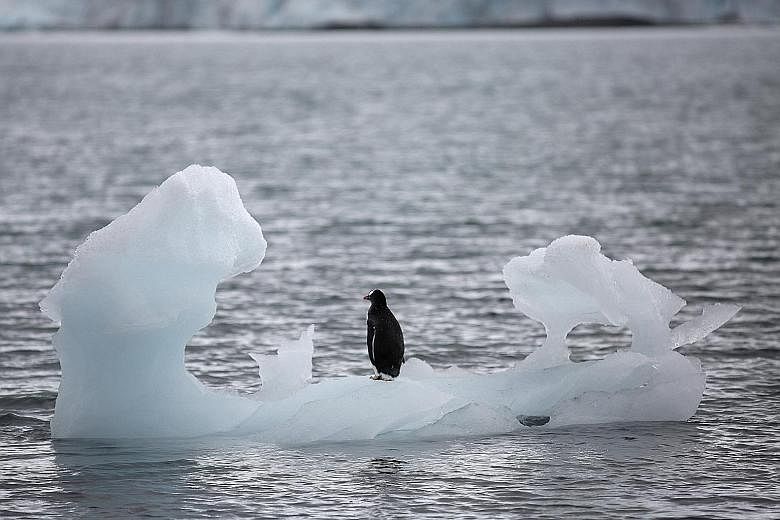NEW YORK • Between 60 and 90 per cent of the world's fresh water is frozen in the ice sheets of Antarctica, a continent roughly the size of the US and Mexico combined.
If all that ice melted, it would be enough to raise the world's sea levels by roughly 61 metres.
While that won't happen overnight, Antarctica is indeed melting, and a study published on Wednesday in the journal Nature shows that the melting is speeding up. The rate at which Antarctica is losing ice has more than doubled since 2012, according to the latest available data.
The continent is now melting so fast, scientists say, that it will contribute 15cm to sea-level rise by 2100 - the upper end of what the Intergovernmental Panel on Climate Change has estimated Antarctica alone could contribute to sea-level rise this century.
"Around Brooklyn you get flooding once a year or so, but if you raise sea level by 15cm then that's going to happen 20 times a year," said Professor Andrew Shepherd from the University of Leeds and the lead author of the study.
Even under ordinary conditions, Antarctica's landscape is perpetually changing as icebergs calve, snow falls and ice melts on the surface, forming glacial sinkholes known as moulins. But what concerns scientists is the balance of how much snow and ice accumulates in a given year versus the amount that is lost.
Between 1992 and 2017, Antarctica shed 3 trillion tonnes of ice. This has led to an increase in sea levels of roughly three-tenths of an inch (less than 1cm), which doesn't seem like much. But 40 per cent of that increase came from the last five years of the study period, from 2012 to 2017, when the ice-loss rate accelerated by 165 per cent.
Antarctica is not the only contributor to sea-level rise. Greenland lost an estimated 1 trillion tonnes of ice between 2011 and 2014. And as oceans warm, their waters expand and occupy more space. The melting ice and warming waters have all been primarily driven by human emissions of greenhouse gases.
The study also helps clear up some uncertainty linked to regional differences in Antarctica. West Antarctica and the Antarctic Peninsula have been known for some time to be losing ice. In East Antarctica the picture has been muddled as the ice sheet there gained mass in some years and lost it in others. East Antarctica has sometimes been a focus of attention for people who deny the science of global warming.
"A lot of the argument has been made by stakeholders that are not quite as interested in dealing with climate change that the East Antarctic ice sheet is actually gaining mass - therefore we don't need to worry," said Ms Michele Koppes, a glaciologist at the University of British Columbia, Canada.
More than 80 researchers from around the world, however, concluded that the changes in East Antarctica were not nearly enough to make up for the rapid loss seen in West Antarctica and the Antarctic Peninsula. Antarctica is, on balance, losing its ice sheets and raising the world's sea levels.
NYTIMES

